By Win Gruening
This article was originally published by The Juneau Empire on November 11, 2021.
 With every passing day, the justification for Juneau switching to universal vote-by-mail becomes murkier, more problematic and less convincing.
With every passing day, the justification for Juneau switching to universal vote-by-mail becomes murkier, more problematic and less convincing.
The ballots of 352 voters were not counted because the post office failed to postmark the ballot envelopes. Last week, those voters received form letters from the city clerk notifying them they were among the disenfranchised.
Most, no doubt, were livid.
As detailed in my two previous columns, problems associated with Juneau’s recent by-mail election have made voting more confusing and unreliable, resulting in almost 8% of ballots being invalidated for various reasons. Vote-by-mail did not increase turn-out, as barely 30% of registered voters participated, 28% less than voted last year and below voter turn-out in past elections where in-person voting was used.
Voters are likely to trust vote-by-mail even less next year.
There also seems to be confusion about the actual costs of the new system.
Mayor Beth Weldon recently noted that vote-by-mail elections are more expensive, $400,000 more per year than in-person elections. This is significantly more than previously reported when the Assembly studied the issue last spring. This is in addition to the estimated $700,000 for equipment and building renovations required for vote counting.
Despite Juneau’s low turn-out, during a post-election KINY interview, City Manager Rorie Watt stated the Assembly is “convinced that vote-by-mail is a good, long-term decision.” In an earlier interview, Mayor Beth Weldon offered this explanation for the disappointing voter turn-out: “…we didn’t have a big bond package. We didn’t have a big controversial thing. We didn’t have a vastly contested race.”
Maybe so, but isn’t this a tacit admission that issues and candidates drive turn-out, not whether voters feel vote-by-mail is more convenient?
If that’s the case, why is the Assembly spending over one million of our tax dollars this coming year to get this misguided effort off the ground?
Some unfairly blame the Alaska Division of Elections for not keeping the database of registered voters current, thereby allowing ballots to be mailed to invalid addresses and to the names of voters who have died or moved to other states.
But, under state law, every eligible person over the age of 18 applying for a Permanent Fund Dividend is automatically registered – whether they intend to vote or not. In addition, the Division of Elections’ annual voter list maintenance process must comply with state law and the requirements of the National Voter Registration Act. Voters are not required to update their registrations (and rarely do) and they cannot be removed from the voter list for simply not voting.
Annually, DOE notifies registered voters who may no longer be eligible but, by law, these voters cannot be removed or declared inactive unless they haven’t contacted DOE nor voted in any local or state election for at least four calendar years.
The 2020 census data reveals that 75.4% of Alaskans are 18 years or older. This results in a potential voter population of 552,976 – almost 42,000 voters fewer than are currently registered.
Barring a seismic shift in state and federal law and voters who voluntarily update their status, excessive numbers of ineligible voters will remain on active voter rolls.
Unfortunately, city taxpayers will continue to bear the needless cost of printing and mailing ballots that will never be used. (CBJ documented over 18,000 unreturned ballots in 2021)
Despite evidence to the contrary, Juneau’s city leaders continue to insist that vote-by-mail was a wise expenditure. With increasing pressure on municipal finances, an uncertain economy and struggling businesses, it’s hard to understand why this initiative, with no measurable benefit, hasn’t been responsibly reevaluated.
One can only wonder what other questionable spending is in the works. The CBJ is now concluding an unofficial survey of citizens about a brand-new city hall. Presumably, the results, including the comments, will be shared with the public. Following the disappointment of vote-by-mail, will a new city hall be the next “best” thing?
After retiring as the senior vice president in charge of business banking for Key Bank in Alaska, Win Gruening became a regular Opinion Page columnist for the Juneau Empire. He was born and raised in Juneau and graduated from the U.S. Air Force Academy in 1970. He is involved in various local and statewide organizations and currently serves on the board of the Alaska Policy Forum.